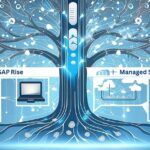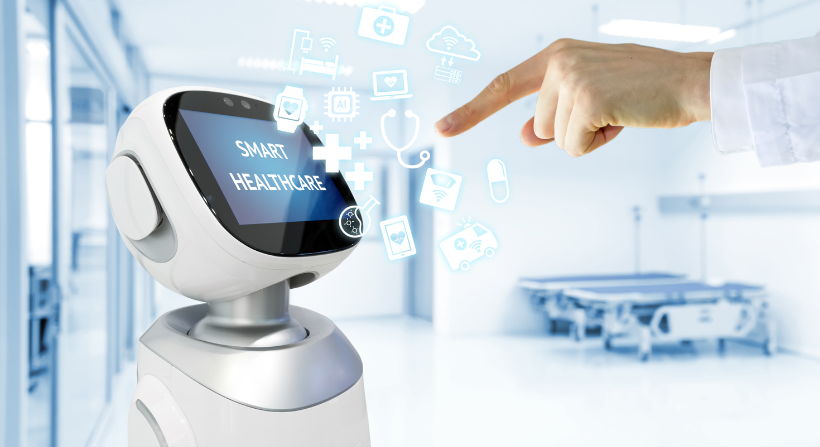The use of big data has changed the way data is collected, stored, and leveraged. Today it is being used in a large number of domains. Healthcare is most likely one of the areas where data analytics is used with the highest impact. Big data in healthcare can be used to lower treatment costs, predict epidemics, prevent diseases, and save lives.
This article explores the role of big data in healthcare with a special focus on a few examples of real-life cases where companies can benefit from using big data within the healthcare industry.
Applications of Big Data in Healthcare
Big data in healthcare can be used to assist in studying both the population’s health and individual’s health information. As a result, it has several applications in various areas, as mentioned below.
1. Electronic Health Records (EHR)
EHR is the broadest use of big data in healthcare. Records are shared using secure data frameworks and are accessible to suppliers from both the general population and confidential areas.
Each record includes one modifiable document, allowing healthcare professionals to make changes over time without the need for paperwork or the risk of information replication.
Even though EHR is really smart, many nations struggle with its implementation. The U.S. has taken a significant jump, with 94% of emergency clinics embracing EHRs as indicated by HITECH research, however, the EU lingers behind
2. Real-Time Alerts
In clinics, Clinical Decision Support software dissects clinical information on the spot, furnishing professionals with guidance as they pursue prescriptive choices. For instance, if a patient’s pulse increments alarmingly, the framework will send a live alert to the specialist, to make an immediate move and manage measures to bring down the tension.
Another model is that of Asthmapolis, which has begun to involve inhalers with GPS-empowered trackers to distinguish asthma patterns both on a singular level and checking bigger populaces out. This information is being utilized related to information from the Centers for Disease Control (CDC) to foster better treatment plans for asthmatics.
3. Predictive Analytics in Healthcare
Predictive analytics assist specialists with pursuing information-driven choices in practically no time and work on patients’ therapy. This is especially helpful on account of patients with complex clinical narratives experiencing numerous circumstances.
Optum Labs, a US research cooperative, has gathered EHRs of more than 30 million patients to make an information base for prescient investigation instruments that will work on the conveyance of care.
New Business Intelligence (BI) arrangements and apparatuses would likewise have the option to anticipate, for instance, who is in danger of diabetes and in this way be educated to make use concerning extra screenings or weight the board.
4. Cancer Research
Clinical analysts can utilize a lot of information on therapy plans and recuperation paces of disease patients to find patterns and medicines that have the most noteworthy paces of progress in reality.
For instance, scientists can look at growth tests in biobanks that are connected with patient treatment records. Utilizing this information, analysts can see things like how certain changes and disease proteins collaborate with various medicines and find drifts that will prompt improved results.
This information can prompt unforeseen advantages, for example, observing that Desipramine, which is a stimulant, can assist with relieving particular sorts of cellular breakdown in the lungs.
5. Smart Staff Employment
Without a strong staff, patient consideration will wane, administration rates will drop, and missteps will occur. In any case, with huge information devices in medical care, smoothing out your staff organization exercises in an abundance of key areas is conceivable.
Through big data in healthcare, it’s feasible to anticipate when you could require staff, specifically divisions, at busy times while circulating gifted faculty to different regions inside the foundation during calmer periods.
In addition, clinical information examination can enable ranking staff or agents to offer the right degree of help when required, work on essential preparation, and make crucial staff and faculty in the board processes as proficient as could be expected.
6. Advanced Disease Control
By diving into experiences, for example, drug type, side effects, and the recurrence of clinical visits, among numerous others, it’s workable for medical services establishments to give precise protection care and, at last, diminish clinic affirmations.
Not only will this degree of hazard estimation bring about diminished spending on in-house patient consideration, but it will also guarantee that space and assets are accessible for the people who need it most.
Subsequently, big data for medical services can work on the nature of patient consideration while making the association all the more monetarily smoothed out in each key region.
7. Betterment in Drug Prescription Processes
One of the organizations applying it is Express Scripts, a foreign association that oversees drug inclusion for clients who give health care coverage plans. As indicated by a distribution from the US-based organization, Pharmaceutical Journal, gathered information from 83 million patients, which included all that from patients’ clinical and social qualities.
With this information close by, Express Scripts can foresee significant situations, for example, who is probably going to become dependent on a specific prescription or who isn’t sticking to its treatment. Express Scripts expressed that they cut the non-adherence pace of hepatitis C patients from 8.3% to 4.8%.
8. Medical Imaging
Medical imaging is fundamental, and every year in the US, around 600 million imaging systems are performed. Analyzing these pictures physically is costly both concerning time and cash, as the need might arise to analyze each picture exclusively, while clinics need to store them for quite a long time.
Medical imaging supplier Carestream makes sense of how big data in healthcare could change the way images are perused: algorithms developed through the analysis of countless images could distinguish explicit examples in the pixels and convert them into a number to assist the doctor with the determination.
ZirkelTech Leading Big Data Innovation in Healthcare
These examples of big data in healthcare demonstrate that clinical applications can save lives and ought to be a main concern of specialists across the field. Even now, information-driven examination works with early recognizable proof as well as mediation in sicknesses while smoothing out establishments for swifter, more secure, and more precise patient consideration.
Because of this necessity, ZirkelTech is a colonizer in application improvement, offering many administrations, including big data technology.
Our ability in profound industry experiences particularly positions us to figure out your business work processes. Enhance safety, dependability, and efficiency by finding much more about the abilities of big data in several fields.
Also Read: Exploring the Role of AI in IoT Devices
Contact ZirkelTech today to build responsive enterprise apps and unlock the potential of your data!
FAQs
What are the benefits of big data in healthcare?
Big data in healthcare lessens the expense of getting and giving medical care by recognizing proper therapy plans, assigning assets insightfully, and distinguishing potential medical problems before they happen.
What is big data used for in healthcare?
Information experts working in medical care utilize big data for different applications, from basically working on the patient experience to making complex AI models equipped for diagnosing ailments utilizing X-beam examinations.
What are the challenges of big data?
Security challenges are essentially as different as the wellsprings of information coming into your Big Data storage. Data quality; the precision, significance, and fulfillment of the information; is another normal trouble spot. There are also difficulties while carrying out any big data program including exponential development of collections of data.






